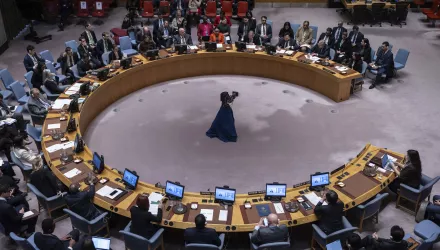BEIRUT -- King Abdullah II of Jordan has told the Times of London that the United States is promoting a peace plan for the Middle East involving a "57-state solution" -- by which he means the entire Muslim world would recognize Israel. The "prize" that is on offer to Israel, he says, is, "a third of the world to meet them with open arms." But he couples this with a warning that if peace talks are delayed another conflict between Arabs or Muslims and Israel in the next 12-18 months becomes inevitable.
The paper adds that, as incentives to Israel to freeze the building of settlements in the West Bank, Arab states may offer to let the Israeli airline El Al fly through Arab air space and grant visas for Israelis. In other words, the Arab world is offering Israel new concessions and enticements in order to do something that any law-abiding country should do on its own -- in this case, stop building settlements on stolen Palestinian and Syrian land.
These appear to be the first details of the reported "re-launch" of the 2002 Arab peace plan that offers full peace with Israel in return for its withdrawing from the territories occupied in 1967, the creation of a sovereign Palestinian state, and the negotiated resolution of the Palestinian refugee issue. If so, this is welcomed news, but it should also set off some warning alarms about the Arab tendency to do two things on a regular basis: to warn that this is the last chance for peace, and to try to entice Israel into negotiating seriously by making new concessions.
I am in favor of the Arab peace plan and have always advocated that the Arab countries should be far more energetic and creative in activating its diplomatic potential, and pushing for its implementation. The plan's offer of a full, permanent peace with Israel should be attractive to the Israelis and their supporters around the world, especially in the United States. It apparently puts on the table everything Israel and the United States say they seek: a credible sign of the Arab world's willingness to live with Israel and have normal relations with it. The fact that Israel and the United States have both largely ignored the plan since its birth seven years ago indicates either that Israel is not interested in a comprehensive peace, or that the terms offered are too harsh for it.
If the Times' report is accurate -- always a real possibility -- its most important element would be the close coordination between the Obama administration and various Arab parties to push for a comprehensive peace conference before the end of this year -- something like the 1991 Madrid peace conference. Details will be thrashed out in a series of bilateral diplomatic meetings in the coming months, starting with Obama's meeting with Israeli Prime Minister Benjamin Netanyahu in Washington next week. If all goes well, the "peace initiative" being cooked up now could form the centerpiece of Obama's major address to the Muslim world in Egypt on June 4.
The available signs to date indicate that the Obama administration plans to apply some diplomatic pressure on Israel and the Arabs to move them towards talks on a two-state solution, though it remains unclear how hard and how soon Washington might do this. King Abdullah II reflected the prevailing Arab penchant to put all the onus for progress on the United States and Israel, saying that, "If there is procrastination by Israel on the two-state solution or there is no clear American vision for how this is going to play out in 2009, then all the tremendous credibility that Obama has worldwide and in this region will evaporate overnight if nothing comes out in May."
This is probably an exaggeration that reflects the worry of many Arab leaders who witness the continued slow political frustration, radicalization and Islamicization of their people -- and whose patience with the United States and Israel has worn thin. The problem with offering Israel more concessions just to start talks for a negotiated resolution of the conflict is that nothing is required in return from Israel. Rather than Arab leaders making enticing offers to Israel, it would be more effective if the United States -- or any other credible external mediator -- suggested that both sides make simultaneous gestures that reflect their sincerity about wanting a negotiated peace.
The Arab world is once again correctly expressing its sincerity in negotiating a comprehensive peace agreement with Israel, but in doing so it should not repeat the mistakes of the past -- especially in making continuous concessions before getting back from Israel any concessions in return. Perhaps offering Israel tourist visas and overflight rights are merely "confidence-building measures," not to be confused with substantive political moves. If so, such gestures will remain ineffective if they only show one side's desire for peace.
Rami G. Khouri is Editor-at-large of The Daily Star, and Director of the Issam Fares Institute for Public Policy and International Affairs at the American University of Beirut, in Beirut, Lebanon.
Khouri, Rami. “Peacemaking Needs Two Sides.” Agence Global, May 13, 2009





